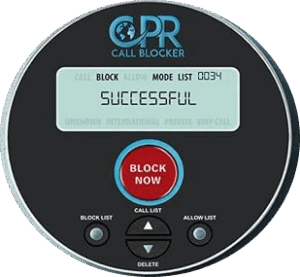 I was getting 40 or more robocalls per day on my landline phone. As a senior citizen I got all the robocalls you get, plus all the marketing calls directed at seniors.
I was getting 40 or more robocalls per day on my landline phone. As a senior citizen I got all the robocalls you get, plus all the marketing calls directed at seniors.
Day by day, my frustration grew. These robocalls were relentless.
Morning, noon, and evening the calls kept coming. Sometimes every 5 minutes a robocaller would interrupt the work I was doing on the computer.
If you are bother by nerverending robocalls, I can sympathize with you.
What would you do?
My initial solution was to unplug my phone. That gave me peace, but at the cost of missing one or two real calls per day.
CPR Call Blocker
Next, I ordered a CPR Call Blocker. It’s got the big red “BLOCK NOW” button that records the phone number of the current caller. It prevents calls from these remembered numbers from ringing your phone.

Much to my surprise it did little or nothing to stem the tide of the robocall marathon.
I pressed the red button on every robocall I got. Time after time! I blocked one number after another.
Then I discovered the problem. It’s why the CPR Call Blocker cannot possibly work.
The problem is Caller ID “spoofing.” Robocaller software picks a different phone number to be their Caller ID number each time it starts calling a series of numbers.
Usually the fake, or spoofed, Caller ID phone number is the same area code as the phone it’s calling. So, the call is not blocked and you are bothered yet again!
The Best Robocall Blocker for Landlines at Last!
Robocalls start out with a computer voice making a general statement and asking a question like, “How are you today?” If the answer is unimportant to the purpose of the call, the computer pauses for a few seconds to allow you to answer. Then it goes on with its message.
Once it gets to a qualifying question it may let a speech recognition software decode your answer, then either hang up or pass you on to a human.
The key is, the robocall cannot respond to what your say.
What I needed was a “secretary” to answer my phone and see if the call was a real call from a human or another unwanted robocall from a computer.
So, I looked for an automated “secretary” that would tell the caller to do something in order for the call to be completed, making my phone ring.
I emailed the CPR Call Blocker folks to see if they had anything like this. And, they didn’t.
So, I searched everywhere I could think of to locate a device that would answer the phone call and request the caller to do something, like enter a number on their dialpad in order for the call to get through.
I searched for a while until I discovered the best robocall blocker for lanklines which completely eliminated all robocalls.
The only call I get now are from real, live, humans.
Watch the following video to see the best robocall blocker for landlines you could imagine. It’s simple to use and works 100% of the time.
